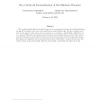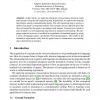19 search results - page 1 / 4 » Language Games with Mixed Populations |
ECAL
2003
Springer
13 years 10 months ago
2003
Springer
This paper presents an adaptation of Luc Steels’s model of Category Formation and Language Sharing. The simple competitive learning algorithm is proposed as a more general means ...
EELC
2006
13 years 9 months ago
2006
How does a shared lexicon arise in population of agents with differing lexicons, and how can this shared lexicon be maintained over multiple generations? In order to get some insig...
ICALP
2009
Springer
14 years 5 months ago
2009
Springer
We consider graphical games in which edges are zero-sum games between the endpoints/players; the payoff of a player is the sum of the payoffs from each incident edge. We give a si...
ACL
1998
13 years 6 months ago
1998
The paper argues that language change can be explained through the stochasticity observed in real-world natural language use. This thesis is demonstrated by modeling language use ...
EELC
2006
13 years 9 months ago
2006
In this article, we study the emergence of associations between words and concepts using the self-organizing map. In particular, we explore the meaning negotiations among communica...


